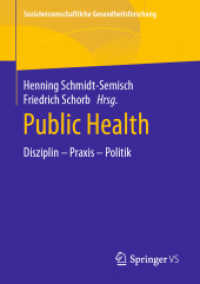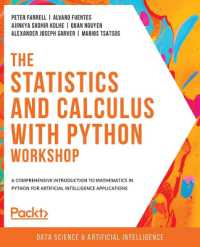- ホーム
- > 洋書
- > ドイツ書
- > Mathematics, Sciences & Technology
- > Biology
- > Ecology
Full Description
Sustainable management of organic residues dragged attention to develop model circular based economy in agriculture. Exponential increase in animal farming to meet the food security goals appeared as one of the major contributors of organic waste produce. Sustainable and effective transformation of this waste into fertilization resource, has become an urgent topic for environmental protection; while newly imposed regulations have been enforcing the researchers to obtain nature-based solutions (NBS). Major problems during composting of organic residues are Greenhous gas emission (GHG), nutrient loss, ammonia volatilization, denitrification, nitrate leaching: thus, poor quality manures production. Thus, it is necessary to understand the mechanism during the composting process to develop sustainable composting practices by using NBS; to address multiple issues by a unique treatment method.
The future of agriculture must change to adapt more sustainable approaches and recycling the organic residues to minimize the environmental impacts. Application of these transformed organic residues to soil to improve the soil natural properties and enrich the natural microbiome. The better crop performance and improved environmental health in a holistic approach is major objective. The past decade provided innovations and new technologies on the impact and use of organic composts in fields with tremendous outcomes. This book provides a wider and recent literature on evolution, multiple nature-based solutions, reduced environmental hazards and better management of organic waste produce towards transformation into usable manure for value added services. This compilation may provide a basis of further investigation of this potential key to achieve the sustainable management practices in modern agriculture.
Contents
Composting: Historical background to modern prototypes of composting process.- Overview on different nature-based ingredients in composting process and their potential value addition.- Earthworm mediated bio composting and basic transformation mechanisms in organic matter.- Greenhouse gases emissions during composting under field condition and their impact to environmental health.- Composting techniques for Poultry farm based organic residues and their sustainable application to improve soil nitrogen content.- Exploring the organic residual matter from cattle industries and microbial dynamics in composting.- Evolution of modern methods to understand the microbial community and metabolic dynamics of compost.- Composting: Improved Crop Performance and Resilience for environmental friendly practices.- Reducing the chemical fertilizer in agriculture by composting and improving the self-reliance; perspective for long term impact.- Compost application for Soil Health and Nutrient restoration; benefits and limitations.- Improving the nutrients uptake in crops by compost application; in diverse agricultural contexts.- Nanotechnology advances in composting.- Composting: Future Perspectives in sustainable Agricultural in different geographical and climatic conditions.- Existing challenges and opportunities in composting to different scales.- Composting: Safety and Regulatory Considerations in Sustainable Agriculture.








